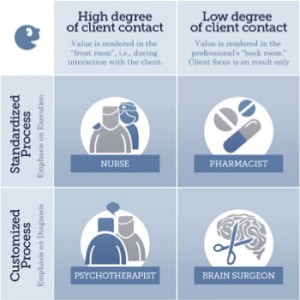
I meet and talk with a lot of independent management consultants. 99% of them are extremely busy. They are so busy that they have little time to learn new approaches, keep up with the development in their area(s) and develop their business. Most of them even complain that they are too busy. They also use their busyness as an “excuse” for not being responsive and not meeting deadlines.
When I ask why they are so busy the unison answer is: “client projects”. My response is: “Fantastic, you must be making tons of money?” Answer: “Silence.”
The silence continues when I ask them: “When will you increase your prices and with how much?”
This series of posts will address the “many hours/low price” issue, explain the causes and provide recommendations for how you can remedy the situation. Applying the ideas should enable you to work less hours, make more money and have more fun at the same time.
The #2 skill to master: Sales Skills
Books about selling can fill an entire library. I assume you have read some of them. Most of the literature is about selling products and services. Is selling management consulting any different?
Not really. B2B selling is always about facilitating a purchase decision. Nobody engages a management consultant unless there is a major challenge and/or a major opportunity, which the client cannot handle internally. Management consultants are engaged when there is a lot at stake.
The four types of consulting

Are you familiar with the four types of consulting? The credit for defining the four types of consulting goes to David H. Maister. If you claim to be a management consultant, but have never heard of David H. Maister, I would question your seriousness and dedication. Read his books!!
The sales approach differs somewhat depending on which type of management consulting you are offering.
Lead generation
Lead generation is the discipline of identifying potential clients for your services. If you are providing “chemist type services” lead generation can be a part of your sales process. You may even be doing some type of [slider title=”justified”] justified means that there is a compelling event. Maybe you have got a tip or read something indicating a certain issues, which is your speciality mastering. [/slider] cold calling.
If you are providing any of the other three types of consulting services I will consider lead generation an integrated part of your networking effort: Your potential clients will find you. However, that someone is calling on you (e-mail or phone call) doesn’t mean they should become your clients.
Qualification
As an independent management consultant you want to ensure that each engagement increases your value in your next engagement. This mean that you will disqualify any engagement, which will dilute your position in the market. The first blog post in this series was exactly about this phenomenon.
So let’s assume that you are now evaluating a potential client. The potential client (“client” for short) wants to meet with you. You have the option of meeting the client or starting with a phone call. What do you do?
Start with the phone call.
Your time is precious.
As an independent management consultant you only have 24 hours a day (more on how to “extend” the 24 hours in a later post). You need to sleep for 6-8 hours. You need to develop your skills and competencies. You need to do administrative work. You need to do networking. You need to maintain your website, blog and social network profiles. You need to write whitepapers, articles and books. You need regular physical exercise. And you probably also want to spend some time doing something else.
As an independent management consultant you do not get a fixed salary transferred to your bank account by the end of each month. You live from the invoices paid by happy customers, who value your services because they make a big difference.
There are two good reasons why you take a phone call with the client before you take a meeting.
Saving time
Saving time is not the most important reason, but it is the one which is the easiest to understand.
Taking a meeting with a potential client will require at least 4 hours:
- Preparation: 1 hour
- Meeting: 1 – 1,5 hour
- Transportation: 1-2 hours
- Follow up: 1 hour
A phone call requires 1,5 hours:
- Preparation: 1 hour
- Meeting: 0,5 hour
- Transportation: 0 hours
- Follow up: 0 hours
Qualification
The fact that you are called by a potential client within your target segment and on a potential assignment, which seems to match your positioning doesn’t mean that the client is qualified.
You use the phone call to achieve the following:
- Let the client explain why he or she has contacted you?
- Let the client explain the magnitude of the issue (urgency, importance, what she has already tried, what the consequence of the “zero-option” is (the option of doing nothing) and if the CEO is supporting this initiative (if you are not talking to the CEO already)?
- Do they have the funds required to engage a management consultant?
- If you are satisfied with the answers you make an appointment
- If you are not satisfied with the answers you can ask the client to clarify some issues and settle for a second phone call.
Believe me: The fact that you are being contacted by a potential client doesn’t mean that he is qualified. Just face the brutal facts: You are not being contacted by someone who normally deals with McKinsey & Co., The Boston Consulting Group, Bain & Company or PA Consulting. You are not being contacted by someone with a €2M project. You are most likely being contacted by someone who is not used to dealing with management consultants, but has been pushed in your direction by someone knowing you.
A: The reality is that a lot of companies hate the idea of engaging a management consultant.
B: The reality is that a lot of companies can’t afford engaging a management consultant.
The sole purpose of the phone call is to verify that you are not dealing with one of those companies. The probability of convincing A to love you is slim. The probability of convincing B to find the money is even slimmer. Even though their problem might be gigantic the probability of a deal for you is low. You can give them all your FactSheets and all your whitepapers and all your books, but you should not give them your time.
Qualifying is not easy, but is it absolutely necessary. The art of qualifying is doing it very gently. It is the art of controlling the situation and the conversation. Give the potential client anything, but your time until the moment where you feel confident that there is a genuine willingness to engage.
Other posts in this series:
Post #1: Brand values and positioning
Post #2: Networking
Post #4: The first meeting
Post #5: Self assessment
Post #6: The objectives
Post #7: The deliverables
Post #8: Pricing
Post #9: The proposal
Post #10: Price and Payment terms
Post #11: Client references
Post #12: Delivery
Post #13: Quest for Certainty

Pingback: Increase your prices - part 2 | Helping companies grow
Pingback: Increase your prices - part 1 | Helping companies grow
Pingback: Increase your prices - part 4 | Helping companies grow
Pingback: Increase your prices - part 6: The objectives | Helping companies grow
Pingback: Increase your prices - part 7: The deliverables | Helping companies grow
Pingback: Increase your prices - part 8: Pricing | Helping companies grow
Pingback: Increase your prices - part 10: Negotiating the price and payment terms | Helping companies grow
Pingback: Increase your prices – part 11: Client References | Helping companies grow
Pingback: Increase your prices - part 5: Self assessment | Helping companies grow
Pingback: Increase your prices – part 9: The proposal | Helping companies grow
Pingback: Increase your prices – part 12: Delivery | Helping companies grow
Pingback: Management Consulting: The Quest for Certainty | Helping companies grow
Pingback: Management Consulting Essentials: Networking - Hans Peter Bech
Pingback: Management Consulting Essentials: Positioning - Hans Peter Bech